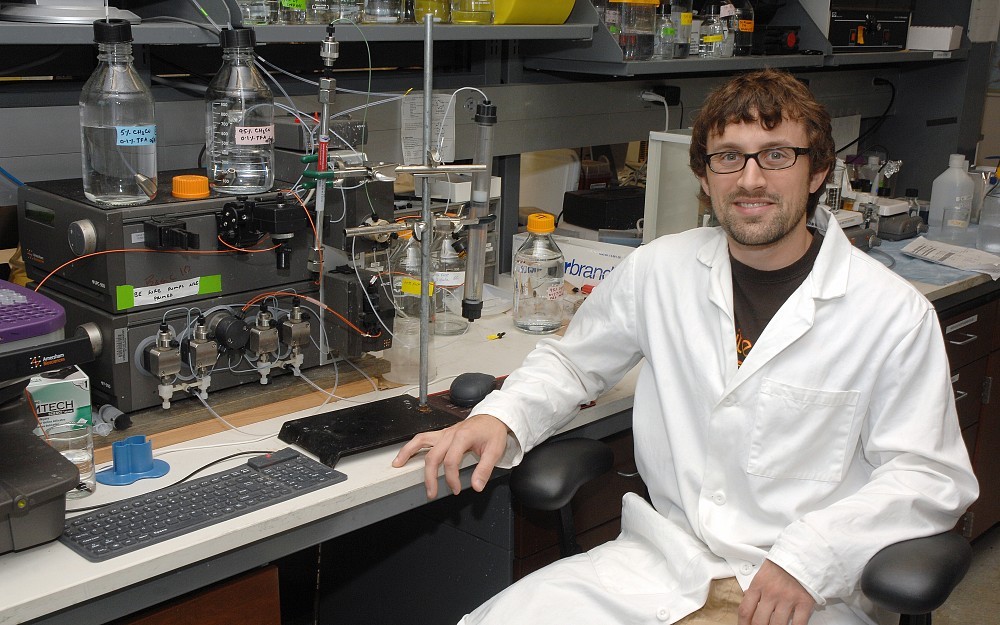
Students Win 2-Year, $50,000 Grants From American Heart Association
Thanks to grants from the American Heart Association (AHA), two graduate students in the UC College of Medicine will spend the next two years conducting research that could lead to therapeutic advances in the fields of cardiology, obesity and muscle-wasting diseases.
Ryan Walker, who works in the lab of Tom Thompson, PhD, an associate professor and structural biologist in the department of molecular genetics, biochemistry and microbiology, and Maggie Powers, who works in the lab of David Askew, PhD, professor in the department of pathology and laboratory medicine, were notified that they were winners of two-year AHA Predoctoral Fellowships beginning July 1, 2012. The total for each award is $50,000, which includes a stipend and professional travel expenses.
Walker's Research
"My background is in neuroscience although Ive always had an interest in pursuing structural biology, says Walker, a 2009 graduate of Miami University with a master's in zoology.
Thompsons lab focuses on myostatin, a protein that regulates muscle growth in animals. Neutralization of an animals naturally occurring myostatin results in a marked increase in muscle mass. Therefore, therapeutics that block myostatin from signaling would stimulate muscle growth.
Walker is interested in studying the naturally occurring protein GASP1, which specifically inhibits myostatin. Previous research conducted by Jennifer Cash, PhD, who earned her doctorate in Thompsons lab, was focused on another natural myostatin inhibitor, follistatin, and led to the first published structure of myostatin.
"That research laid the groundwork for how myostatin can be inhibited by naturally occurring antagonists, and I picked up on another antagonist, GASP1, for my research focus, says Walker.
"GASP1 is very specific for myostatin, and we think that if we can nail down why it is so specific at the molecular level that this knowledge will really help us understand how we can potentially block myostatin without inhibiting other structurally similar proteins.
On this project, the lab is collaborating with Se-Jin Lee, MD, PhD, of the Johns Hopkins University School of Medicine, who originally identified the function of myostatin.
Walker says the ultimate goal is to develop a therapeutic that facilitates muscle growth and reduces adipose (fatty) tissue, providing a benefit to cardiac health along with implications for other muscular pathologies such as muscular dystrophy.
"Ryan has a lot of potential, and this award is a great start toward achieving his goal of one day overseeing his own research laboratory, says Thompson.
Powers' Research
Powers, a student in the Pathobiology and Molecular Medicine Graduate Program, received the award for her project, titled "IreA kinase activity and virulence of Aspergillus fumigates.
"Heart transplant patients undergoing immunosuppressive therapy are at risk for invasive aspergillosis, an often fatal fungal infection most commonly caused by the opportunistic pathogen Aspergillus fumigates, Powers says.
She adds that researchers in Askew's lab are working to identify biological pathways that are required for A. fumigatus to cause disease.
"One such pathway is a stress response pathway known as the unfolded protein response, or UPR," Powers says. "We have shown that without key regulators of this pathway, the ability of A. fumigatus to cause disease is abolished.
"We want to determine if we can specifically target and disrupt this pathway, potentially through drug therapy, and improve disease outcome associated with aspergillosis."

Maggie Powers, a student in the Pathobiology and Molecular Medicine Graduate Program and 2012 AHA Predoctoral Fellowship winner
Related Stories
Can new rules in Ohio address a pharmacy staffing shortage and...
May 17, 2024
The University of Cincinnati's Michael Hegener joined WVXU's Cincinnati Edition to discuss recent rules released by the Ohio Board of Pharmacy designed to address pharmacy staffing.
Is ketamine the answer to treatment-resistant depression?
May 16, 2024
The University of Cincinnati's Stephen Rush joined WVXU's Cincinnati Edition to discuss the use of ketamine and esketamine to treat treatment-resistant depression.
UC study: Severe ischemic strokes rare in total patient...
May 15, 2024
The University of Cincinnati’s Yasmin Aziz will present research at the European Stroke Organisation Conference that found severe ischemic strokes with the most severe damage are rare in the total stroke patient population.
